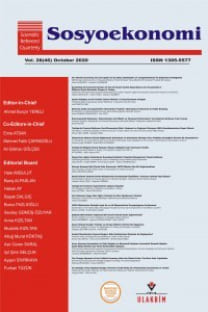Türkiye’de Ticaret Hacmi ve Terör İlişkisi
Bu çalışmada, terörizmin uluslararası ticarete olan etkisi Türkiye özelinde incelenmektedir. 1980-2015 yılları arasında uluslararası ticaretin gelişmesi yolunda çok önemli siyasi ve bilimsel gelişmeler olmakla beraber artan terör olayları nedeniyle uluslararası ticarete belirli sınırlamalar gelmeye başlamıştır. Küreselleşme olgusuyla birlikte uluslararası ticaret olabildiğince genişlemeye başlamıştır. İnternet ve bilişim teknolojilerindeki gelişimde ticaretin çok daha hızlı kolay yapılmasını sağlamıştır. Özellikle ülkelerarası hizmet ticaretinde çok hızlı büyümeler meydana gelmiştir. Bu olumlu gelişmelerle birlikte uluslararası terörizm dünya ticareti üzerine olumsuz etkide bulunmaktadır. İlgili dönemde terör olaylarının artması ticari faaliyetlerde azalmaya yol açtığına dair güçlü deliller vardır. Bu çalışma terörizmin Türkiye’nin dış ticaretini etkileyip etkilemediğine odaklanmaktadır. Bunu yapmak içinde 1970-2016 yılları arasında dış ticaretin teröre karşı duyarlılığı esneklik kavramı ile ölçülmüştür.
Anahtar Kelimeler:
Dünya Ticareti, Terörizm, Ticaret Hacmi Türkiye, Ekonomik Büyüme
International Trade and Terror Relationship in Turkey
In this study, the effect of terrorism on international trade is examined in the case of Turkey. Between 1980 and 2015, along with many important political and scientific developments towards the development of international trade, international trading has begun to reach certain limitations with the terrorist channel. International trade has reached the highest levels in history with globalization phenomenon. International trade has remarkably expanded with the help of widespread internet use information technologies especially in the trade of services. Along with these positive developments, international terrorism has a negative impact on world trade. There is strong evidence that the increase in terrorist incidents led to a decline on international trade. This study focuses on whether terrorism affects Turkey's foreign trade. In doing so, between 1970 and 2016, the sensitivity of foreign trade to terrorism was measured by the concept of elasticity.
Keywords:
Turkey World Trade, Terrorism, Trade Volume, Economic Growth,
___
- Braithewaite and Li (2007). Transnational terrorism hot spots: Identification and impact evaluation, Conflict Management and Peace Science, Volume 24, Issue 4, December 2007, Pages 281-296
- Enders and Sandlers (1999) Transnational terrorism in the post-Cold War era, International Studies Quarterly, 43 (1), 145-67
- Fratianni M. and Kang H.(2006), International Terrorism, International Trade, and Borders, in Michele Fratianni (ed.) Regional Economic Integration (Research in Global Strategic Management, Volume 12) Emerald Group Publishing Limited, Chapter 10, pp.203 – 223.
- IEP (2017) http://economicsandpeace.org/reports/
- Global Terrorizm Database (2017). http://www.start.umd.edu/gtd Accessed 10 May 2017
- Khan, A. And Yusof, Z. (2017) Trade-Terrorist Evaluation Index (TTEİ), Quality and Quantity, vo. 51 issue:1, pp;365-375.
- Li, Quan (2009) The effect of Transnational Terrorism on bilateral trade, People.tamu.edu/quanli/paper/Elgar-2009.pdf (10.09.2017)
- Mc Kenna, J. (2005) Implication of Transnational Terrorism on Intenational Trade, available at www.econ.duke.edu/dje/2006/McKenna.pdf, (Retrevieved, March 2017)
- Mirza, D. and Verdier, T. (2006) International Trade, Security and Transnational Terrorism: Theory and Empirics, World Bank Policy Research Working Paper, No: 4093.
- Nitsch , Volker ve Dieter Schumacker (2004) Terrorism and International Trade: An Empirical Investigation, European Journal of Political Economy, 20, 423-433.
- Pham, Cong S. Ve Hristos Doucouliagos (2017) An Injury to one is an injury to all: Terrorism’s Spillover Effects on bilateral Trade, IZA Institute of Labour Economics, Discussion Paper, IZA DP NO. 10859
- World Development İndicators (2017) www.dataworldbank.org Accessed 10 May 2017
- ISSN: 1305-5577
- Yayın Aralığı: Yılda 4 Sayı
- Başlangıç: 2005
- Yayıncı: Sosyoekonomi Derneği
Sayıdaki Diğer Makaleler
Türkiye’de Zamana Dayalı Eksik İstihdamın Karakteristiği: Hanehalkı İşgücü Anketlerinden Bulgular
Mali Yerelleşmenin Başarı Şansı ve Etkinliği Tartışmaları
Tasarruf ve Kâr Oranları ile Konjonktür Dalgalanmaları Arasındaki İlişki
Efe Can KILINÇ, Cafer Necat BERBEROĞLU
Reel Çıktı (Reel GSYİH) ve İşsizlik Oranı İlişkisi: Euro Bölgesi İçin Okun Yasası Analizi
Türk Cumhuriyetleri’nde CO² Emisyonu ve Ekonomik Büyüme İlişkisi: Panel Nedensellik Analizi
Yüksek Teknolojili Ürün İhracatı: Lider Ülkeler ve Türkiye Analizi
Firmaların Sermaye Yapısını Etkileyen Faktörler: Demir Çelik Metal Ana Sanayi Uygulaması
Banka Kartelinin Türkiye Kredi Pazarindaki Rekabeti Sınırlayıcı Etkileri
